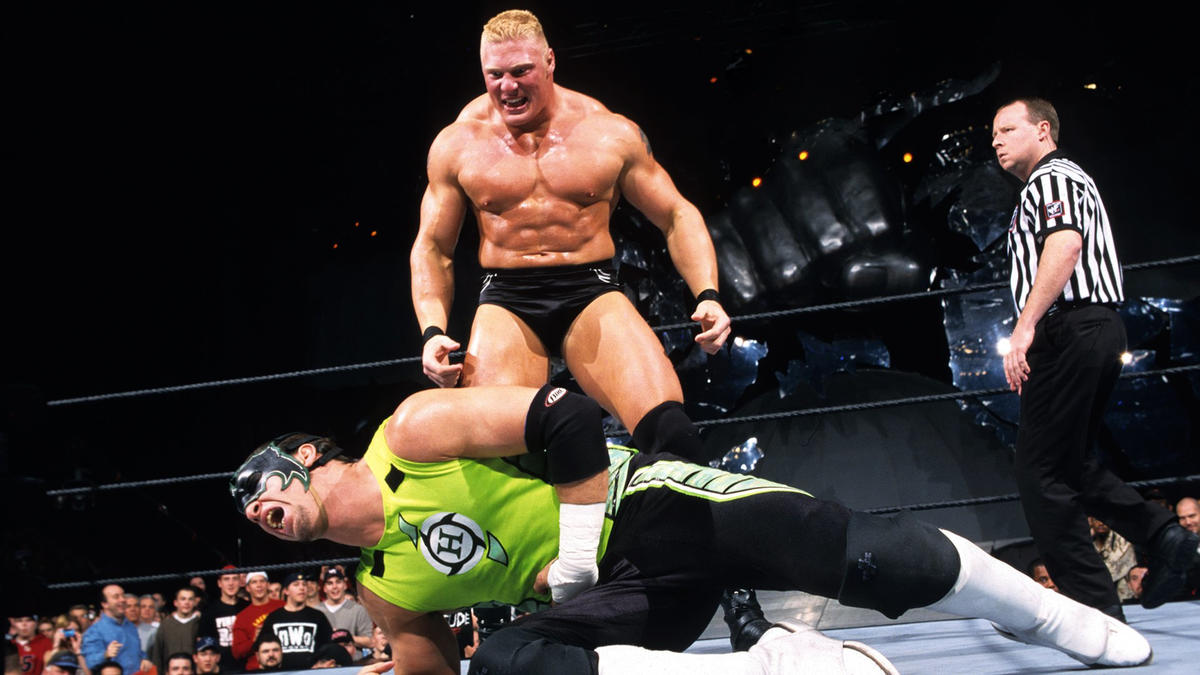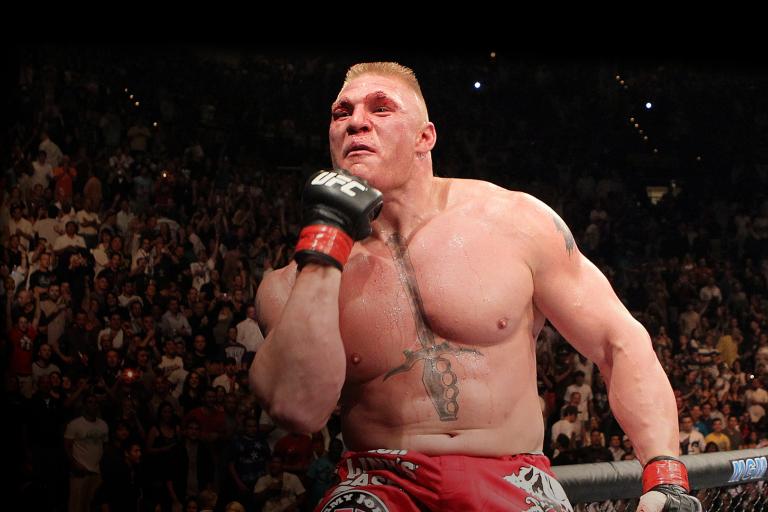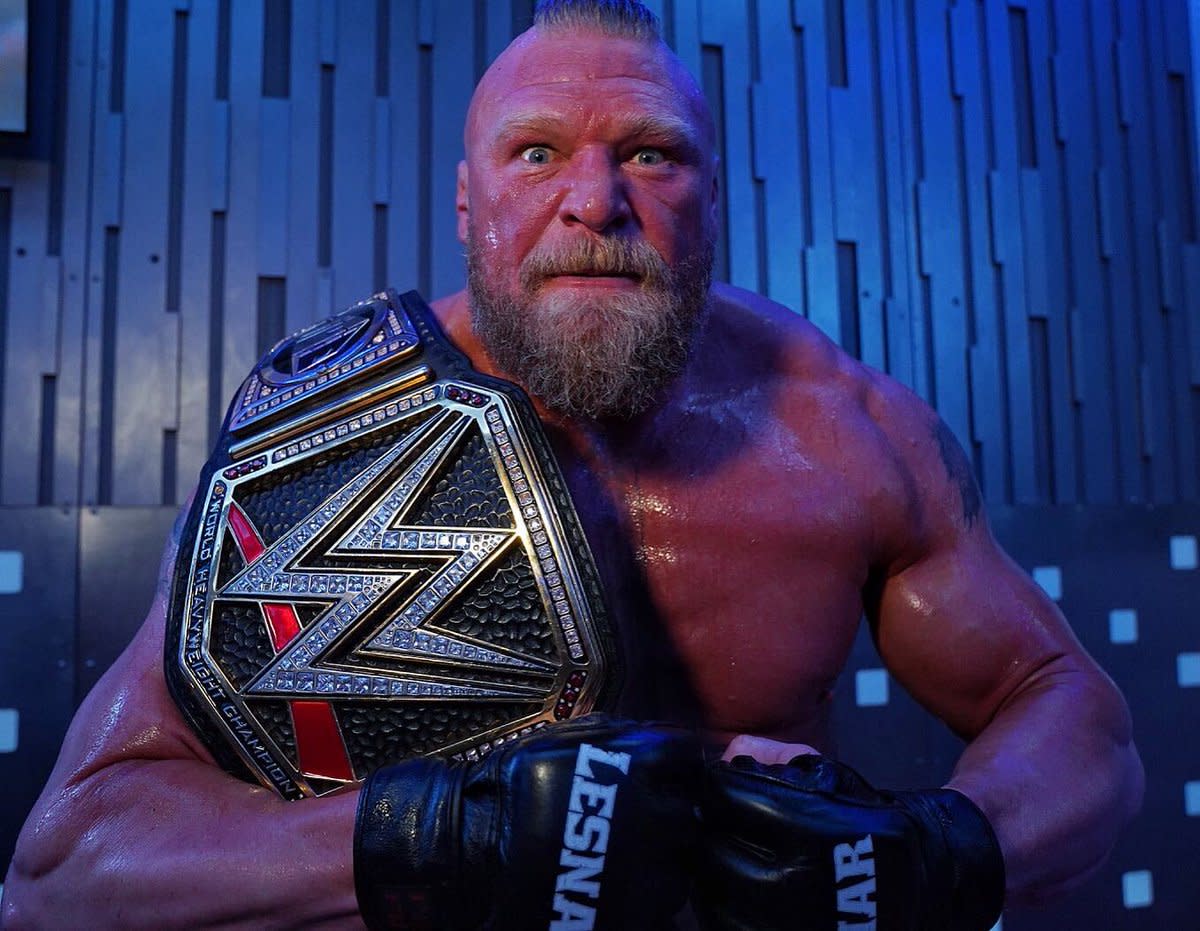Brock Lesnar's Jump To WWE And UFC Was More Impressive Than You Thought
When you hear the name Brock Lesnar, what's the immediate thought that pops into your mind? Is it that he's a former NCAA Division 1 Heavyweight Champion? Is it that he's a multi-time WWE Champion? Or is it that he's also a former UFC Heavyweight Champion? Perhaps the most impressive thing about Lesnar's career, when you get down to it, has been his ability to transition between all three.
Winning the NCAA Division 1 Heavyweight Championship was first on Lesnar's resume, as he accomplished that milestone in 2000 while wrestling at the University of Minnesota. Lesnar ended his career in amateur wrestling as a two-time NCAA All-American, a two-time Big Ten Conference Champion, and the 2000 NCAA Heavyweight Champion, holding a record of 106-5 during his four-year college career. And shortly after that career ended, another emerged, with Lesnar signing a WWE developmental contract in 2000 with Ohio Valley Wrestling. His rise to the top of WWE happened with unprecedented speed, and when he left in 2004, his rise to the top of mixed martial arts followed the same pattern. It seems that no matter where Lesnar goes, he conquers, and unlike most other premiere athletes, he conquers extremely quickly.
"The Next Big Thing" debuts in WWE

(Photo Credit: WWE)
In 2002, at the age of 25, Brock Lesnar made his presence known immediately in WWE, interrupting a Hardcore Championship match involving several competitors on "WWE Raw." Lesnar demolished the talent in the ring, nailing Spike Dudley with a series of iconic powerbombs while his manager, Paul Heyman, shouted "Up and down!" His debut immediately showcased Lesnar as a serious danger to all in the WWE locker room, and he quickly solidified that claim by winning the then-annual King of the Ring tournament in his rookie year. But no one could have suspected just how meteoric his rise would be — at least not until August.
At SummerSlam 2002, five months after his debut on "Raw," Lesnar defeated The Rock for the WWE Championship to become (at the time) the youngest world champion in company history, and the second-fastest superstar to win the belt after debuting. By the end of 2003, Lesnar had won the Royal Rumble, main-evented WrestleMania, and become a three-time WWE Champion. And yet, his first run with the company would prove as short-lived as it was successful. Lesnar left WWE in 2004 after wrestling Goldberg at WrestleMania XX, a match that was universally viewed as a flop and was viciously heckled by the audience — partially due to both men's imminent departure from the company. Despite the incredible start to his wrestling career, Lesnar wanted to pursue his dream of playing in the NFL. According to WWE Hall of Famer Kurt Angle, "Vince already knew Goldberg was leaving. He didn't know if Brock was leaving at this particular time, but when Brock came home from that tour and told Vince, it hurt Vince, it stung." Lesnar would go on to lose to Goldberg and leave WWE, setting in motion what would happen next.
"The Beast" wreaks havoc in the UFC

(Photo Credit: UFC)
Lesnar never achieved the football career he wanted, but "The Beast" epitomized that nickname when he jumped into mixed martial arts in 2007, signing with Ultimate Fighting Championship a year later. The former WWE Champion quickly made a name for himself inside the octagon, capturing the UFC Heavyweight Championship in just his fourth professional MMA fight. Lesnar defeated legendary UFC Hall of Famer Randy Couture by knockout and went on to defend the title several times. Destruction and dominance wasn't the only thing Lesnar became famous for throughout his run with the belt — that list would also include his post-fight interviews. After beating Frank Mir in his first title defense, Lesnar had one of the most iconic interviews, stating that "Mir had a horseshoe up his ass," and that he "pulled that son b*tch out and beat him over the head with it." The infamous interview saw Lesnar leave by saying "I'm going to go home tonight, I'm going to sit down with my friends and family, and hell, I might even get on top of my wife tonight. See y'all later."
After defeating Mir, Lesnar would next overcome Shane Carwin before preparing for his biggest test yet, Cain Velasquez. Labeled by many as one of the greatest heavyweights of all time, Velasquez stopped Lesnar's iconic championship run, knocking out "The Beast" in just the first round. Lesnar's story in the UFC would come to a close after he was diagnosed with diverticulitis in 2009, and it was later revealed he had been fighting with the condition. Lesnar would make a one-off return to the UFC in 2016, facing Mark Hunt, but the fight was deemed a no-contest after Lesnar was flagged for steroids. He quickly retired afterward, ending his UFC career for good.
"The Conqueror" Returns To Where It All Began

(Photo Credit: WWE)
In 2012, having just suffered a disappointing defeat to The Rock at WrestleMania 28, John Cena came down to the ring the following night on "Raw" with hopes of The Rock coming down to the ring to shake his hand. Unfortunately for Cena, The Rock never showed — but someone else did. Eight years after his departure from WWE, Brock Lesnar shocked Cena and the world, making his return by landing an iconic F-5 on WWE's biggest star. Lesnar has been part of WWE on and off ever since, though of all the memorable moments from his second run with the company, none is viewed as bigger than his shocking victory over the Undertaker at WrestleMania 30, ending the Deadman's legendary WrestleMania winning streak (which had stood at 21-0) and becoming "The One in 21-1."
Since his return, Lesnar has solidified his legacy as one of the greatest professional wrestlers of all time, dominating his way to several WrestleMania main events and hoisting the WWE Championship 10-times. He has reigned supreme over the WWE for the entirety of his career, spending his part-time schedule making memorable returns and moments for fans while never remaining far from the company's top championships — his world title reigns in WWE now number in double digits. With an iconic career that started in amateur wrestling, possibly gave him too much too fast in WWE, took him on a detour through the UFC, and then brought him back home to pro wrestling, it's clear that if anybody who has earned the right to be called "The Conqueror", it's Brock Lesnar.